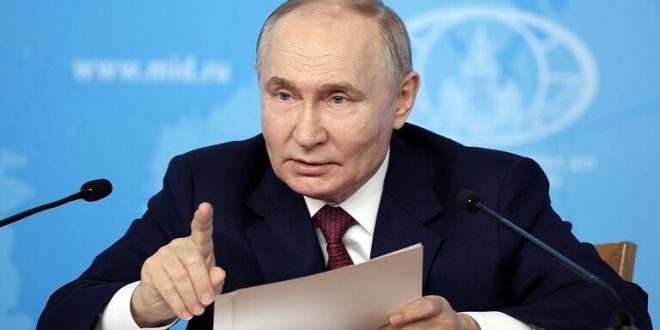Russian President Vladimir Putin stressed that the world has changed and reached the point of no return to what it was before in the international arena and at the level of economy and competition, indicating that Washington continues to undermine global security due to its exit from arms agreements.
Putin explained during a meeting today with the leading cadres of the Russian Foreign Ministry in the presence of Foreign Minister Sergei Lavrov that the collapse of the “Western model” of global security has brought the world to the point of no return, so it’s time to hold an expanded discussion on an alternative collective security system based on bilateral and multilateral guarantees.
“Multipolarity and respect for international law make it possible to resolve the most complex issues in the interests of everyone, build mutually beneficial relations and ensure security for peoples, and Russia is interested in creating an indivisible security system through dialogue, including within the corridors of the United Nations, ” Putin said.
“NATO’s intervention in Iraq, Syria, Libya, Afghanistan, and others, has brought nothing but aggravation of existing problems, the destruction of entire countries, the spread of hotbeds of humanitarian and social disasters and terrorist enclaves,” he added.
Putin stressed that the members of the Collective Security Treaty Organization and the Shanghai Cooperation Organization are ready to solve the basic problems of the Indivisible global security system, and Russia is ready to hold a serious and genuine dialogue with all countries on all issues related to international security based on the security document submitted by the end of 2021.
The Russian President stressed the growing role of the “BRICS” group, noting that its potential will allow it to become one of the basic regulatory institutions of a multipolar global system.
Putin stressed that respect for dialogue, understanding and mutual respect are among the basic principles in groups such as the “BRICS”, which now account for 45 percent of the world’s population and 36 percent of global GDP, which exceeds the contribution of the G7 of 30 percent.
Amal Farhat

